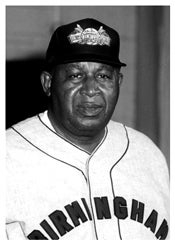Carl Long: Baseball Player, Law Enforcement Officer, Bus Driver, Barrier Breaker
In celebration of Black History Month, Special Collections at East Carolina University has chosen to highlight African American-related materials found in our collections.

Long during his stint playing baseball for the Birmingham Black Barons. Image credited to the Negro League Baseball Museum.
Born on May 9, 1935, in Rock Hill, South Carolina to William Moselle and Ella Long, Carl Long lived a life that saw him break many racial barriers, both on the baseball diamond and in the community of Kinston, North Carolina. In this March 10, 2014 interview conducted by Mr. Jerry Hopfengardner, Long talks about developing his love for the game of baseball at an early age. Despite his family not being able to purchase the needed equipment, such as a baseball, a bat, or gloves, Long and his siblings played the game in the street in front of their house using rocks as baseballs and tree limbs as bats. Long’s first exposure to organized baseball came during a trip with some friends to watch a local farm team. He claimed that he impressed a player with his throwing and was invited to showcase his hitting skills despite the field not allowing African Americans to use its facilities.
Following his “try-out”, Long discussed signing to play baseball with the Philadelphia Stars of the Negro National League (the Stars would relocate from Philadelphia to Nashville, TN. in 1951) for 150 dollars a month, an amount that amazed Long at the time. In his interview, Long talks about his time in Philadelphia, including being mentored by well-known Negro League players such as Pee Wee Butts and sharing the field with the likes of Hank Aaron and Willie Mays. After Long’s success with the Stars caught the attention of Major League Baseball, he signed with the Pittsburgh Pirates in 1954 and was designated to play with the St. Jean Canadians of the Provincial League, a minor league affiliate of the Pirates. During his season with the Canadians, Long had a .275 batting average with 20 home runs and 80 runs batted in (RBIs). Long would go on to play with the Billings Mustangs (1955) and the Phoenix Stars (1955), both affiliates of the Pirates, before being sent to the Kinston Eagles of the Carolina League in 1956. Upon arriving in Kinston, Long became the first African American player to suit up for the Eagles (The Carolina League had been integrated by Percy Miller Jr. in 1951). Long would play for one season in Kinston, appearing in 142 games and hitting 18 home runs and 111 RBIs with a .291 batting average. Following his stint with the Kinston Eagles, Long would play for the Beaumont Pirates (1957) and the Mexico City Tigers (1975) before a shoulder injury effectively ended his playing career in 1957. During his career, Long played in a total of 475 games, hitting 62 career home runs and 309 RBIs with a career batting average of .276.
One of the most interesting parts of Long’s interview is his discussion of the racism and segregation that he faced during his playing career in both Kinston and other cities. Having played at the height of the Jim Crow system of segregation, Long recalled how he and other African American teammates were forced to find accommodations for non-whites during the team’s travels. In cases like Long’s time in Kinston where he was the only African American on the team, he was forced to find separate housing from that used by his teammates and was unable to eat meals with them. This, along with the offensive language and threats that players like Long faced in white ballparks across the South, highlights how even though African American players had the opportunity to play the sport they loved thanks to the Negro League and other leagues that permitted non-whites to play, the day-to-day struggle that was facing and standing up to the Jim Crow system took its toll on many players. Long does an excellent job highlighting this struggle when discussing his playing days.
Following the end of his playing career, Long returned to Kinston and took a job as a box truck driver to support his family. In his interview, Long explains that it was the local sheriff who first came to Long seeking to recruit him as a deputy, due to the need for an African American officer. Despite his lack of interest in law enforcement, Long accepted the job and was sent to various training courses and programs across the eastern region of North Carolina. After serving as Kinston’s first African American deputy, Long was promoted to city detective, also becoming the first African American to hold that position in Kinston. During the interview, Long talks about being the first African American to arrest a white citizen in Kinston, something that up until that point would have never been thought possible. After working as the city detective for some time, Long made a career transition and began driving charter buses to better support his family financially, becoming the first African American bus driver in Lenoir County, North Carolina. Following his retirement in 1995, Long remained a staple of the Kinston community as well as an avid supporter of local baseball. Long spent the majority of his later years building support for the Negro League Baseball Museum. The Kinston Indians honored Long’s legacy and impact on the game of baseball with their “Carl Long Day” at the stadium and inducted Long into the Kinston Professional Baseball Hall of Fame in 2003. Carl Long passed away on January 12, 2015.
Sources:
- “Carl Long Minor & Mexican Leagues Statistics.” Baseball Reference, n.d. https://www.baseball-reference.com/register/player.fcgi?id=long–002car.
- “Carl Long.” Negro League Baseball Museum: eMuseum, 2006. https://nlbemuseum.com/history/players/long.html.
- “Carl Long’s Biography.” The HistoryMakers, 2005. https://www.thehistorymakers.org/biography/carl-long-41.
- “Former Negro League Player Carl Long Dies.” WITN, January 12, 2015. https://web.archive.org/web/20150113043721/http://www.witn.com/sports/headlines/Former-Negro-League-player-Carl-Long-dies-288338661.html.